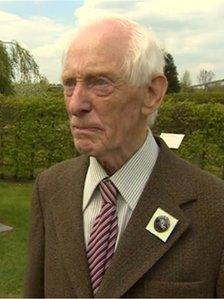Bevin Boys dedication at National Memorial Arboretum
- Published
The Bevin Boys memorial unveiled at the National Arboretum Centre, Alrewas, Staffordshire
A memorial to the "forgotten heroes" who worked in coal mines during World War II has been officially dedicated.
Bevin Boys were conscripted to work as miners while their friends and relatives fought, leading many people to assume they were cowards.
Former Bevin Boy Harry Parkes, from Nottinghamshire, has campaigned for official acknowledgement for decades.
The Countess of Wessex dedicated the memorial at the National Memorial Arboretum in Staffordshire.
The memorial has been in place for over a year, but Mr Parkes said the dedication had given the Bevin Boys "back our dignity that says we served our country".
"The Countess of Wessex name has given this memorial, I feel, credence, and it's given the Bevin Boys the right to stand tall and say I was a Bevin Boy," said Mr Parkes.
The 86-year-old, from West Bridgford, is on the committee for the Bevin Boys Association and designed the memorial.
"That is the answer to all my hopes and dreams for the last 70 years," he added.

Harry Parkes said the dedication was the answer to his hopes and dreams
'Ill-treated by public'
Former Nottinghamshire county councillor Joan Taylor has supported the project to get a memorial for the 48,000 Bevin Boys.
"For Bevin Boys to have something to recognise the fantastic work they did during World War II is marvellous.
"They have been the forgotten heroes of the war," she said.
"Nobody cared. They were ill-treated, I think, by the public. They didn't realise they were conscripted. They thought they were trying to get out of going to fight, but of course, they were fighting down below with the coal."
Alun Lane was among the surviving Bevin Boys at the dedication.
"Being accused of being cowards was very hard to take because it wasn't our fault - we were bound for the coal mines," said Mr Lane.
- Published7 May 2013
- Published11 April 2013
- Published6 September 2012